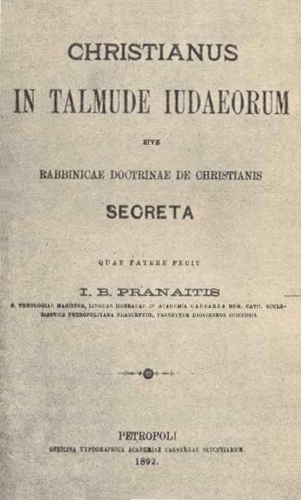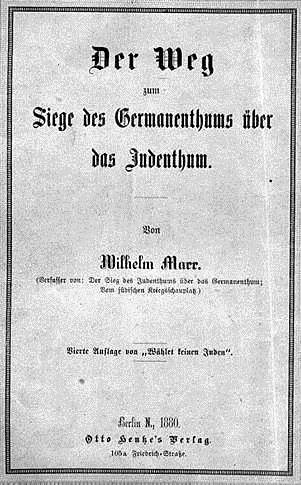|
The Talmud Unmasked
''The Talmud Unmasked'' (Latin: ''Christianus in Talmud Iudaeorum: sive, Rabbinicae doctrinae Christiani secreta''. English: The secret rabbinical teachings concerning Christians) is a book published in 1892 by Justinas Bonaventure Pranaitis (1861–1917). The book, generally regarded as antisemitic, is a collection of purported quotations from the Talmud and Zohar that purports to demonstrate that Judaism despises non-Jews and promotes the murder of non-Jews in some instances. Pranaitis drew on the earlier works of Jakob Ecker and August Rohling. Presentation of the book ''The Talmud Unmasked'' is a collection of alleged quotes from the Talmud, the Zohar and other Talmudic works demonstrating that: #Jews do not regard non-Jews as human beings #the Talmud contains blasphemies against Jesus and offensive passages about Christians #Judaism despises non-Jews #the Talmud urges Jews to do a variety of harms to Christians, such as murder and theft, and teaches that each death of ... [...More Info...] [...Related Items...] OR: [Wikipedia] [Google] [Baidu] |
Justinas Pranaitis
Justinas Bonaventura Pranaitis or Pronaitis''Scapegoat on Trial: The Story of Mendel Beilis - The Autobiography of Mendel Beilis the Defendant in the Notorious 1912 Blood Libel in Kiev'', Beilis, Mendel, Introd. & Ed. By Shari Schwartz, CIS, New York, 1992 (russian: Иустин Бонавенту́ра Пранайтис; 27 July 1861 – 28 January 1917) was a Lithuanian Catholic priest and Professor of Hebrew at the St. Petersburg Roman Catholic Theological Academy. He is best known as the author of the antisemitic text ''The Talmud Unmasked'', and his subsequent involvement in the Bellis trial. Early life and career Pranaitis was born to a peasant family in Griškabūdis, Lithuania, then part of the Russian Empire, and was schooled at the Marijampolė Gymnasium. He attended the Sejny Priest Seminary and graduated with a Master of Theology degree in 1887. In 1892 he published an antisemitic tract called ''Christianus in Talmude Iudaeorum'' in Latin , adapted from his Master's ... [...More Info...] [...Related Items...] OR: [Wikipedia] [Google] [Baidu] |
Eschatology
Eschatology (; ) concerns expectations of the end of the present age, human history, or of the world itself. The end of the world or end times is predicted by several world religions (both Abrahamic and non-Abrahamic), which teach that negative world events will reach a climax. Belief that the end of the world is imminent is known as apocalypticism, and over time has been held both by members of mainstream religions and by doomsday cults. In the context of mysticism, the term refers metaphorically to the end of ordinary reality and to reunion with the divine. Various religions treat eschatology as a future event prophesied in sacred texts or in folklore. The Abrahamic religions maintain a linear cosmology, with end-time scenarios containing themes of transformation and redemption. In later Judaism, the term "end of days" makes reference to the Messianic Age and includes an in-gathering of the exiled Jewish diaspora, the coming of the Messiah, the resurrection of the righte ... [...More Info...] [...Related Items...] OR: [Wikipedia] [Google] [Baidu] |
Antisemitism In Lithuania
Antisemitism (also spelled anti-semitism or anti-Semitism) is hostility to, prejudice towards, or discrimination against Jews. A person who holds such positions is called an antisemite. Antisemitism is considered to be a form of racism. Antisemitism has historically been manifested in many ways, ranging from expressions of hatred of or discrimination against individual Jews to organized pogroms by mobs, police, police forces, or genocide. Although the term did not come into common usage until the 19th century, it is also applied to previous and later anti-Jewish incidents. Notable instances of Persecution of Jews, persecution include the Rhineland massacres preceding the First Crusade in 1096, the Edict of Expulsion from England in 1290, the 1348–1351 persecution of Jews during the Black Death, the History of the Jews in Spain#Massacres and mass conversions of 1391, massacres of Spanish Jews in 1391, the persecutions of the Spanish Inquisition, the Alhambra Decree, expulsion ... [...More Info...] [...Related Items...] OR: [Wikipedia] [Google] [Baidu] |
Antisemitic Forgeries
Antisemitism (also spelled anti-semitism or anti-Semitism) is hostility to, prejudice towards, or discrimination against Jews. A person who holds such positions is called an antisemite. Antisemitism is considered to be a form of racism. Antisemitism has historically been manifested in many ways, ranging from expressions of hatred of or discrimination against individual Jews to organized pogroms by mobs, police forces, or genocide. Although the term did not come into common usage until the 19th century, it is also applied to previous and later anti-Jewish incidents. Notable instances of persecution include the Rhineland massacres preceding the First Crusade in 1096, the Edict of Expulsion from England in 1290, the 1348–1351 persecution of Jews during the Black Death, the massacres of Spanish Jews in 1391, the persecutions of the Spanish Inquisition, the expulsion from Spain in 1492, the Cossack massacres in Ukraine from 1648 to 1657, various anti-Jewish pogroms in the Russi ... [...More Info...] [...Related Items...] OR: [Wikipedia] [Google] [Baidu] |
Antisemitic Canards
Antisemitic tropes, canards, or myths are " sensational reports, misrepresentations, or fabrications" that are defamatory towards Judaism as a religion or defamatory towards Jews as an ethnic or religious group. Since the Middle Ages, such reports have been a recurring motif of broader antisemitic conspiracy theories. Some antisemitic tropes or false accusations date back to the birth of Christianity, such as the allegation that the Jews are collectively responsible for the crucifixion of Jesus. In Medieval Europe, the scope of antisemitic tropes expanded and became the basis for regular persecutions and formal expulsions of Jews in England, France, Germany, Spain and Portugal. During these times, it was widely believed that Jews caused epidemics like the Black Death by poisoning wells. Jews were also accused of ritually consuming the blood of Christians. Starting in the 19th century, the notion first emerged that Jews were plotting to establish control over th ... [...More Info...] [...Related Items...] OR: [Wikipedia] [Google] [Baidu] |




